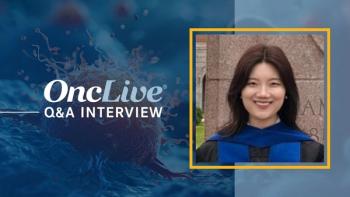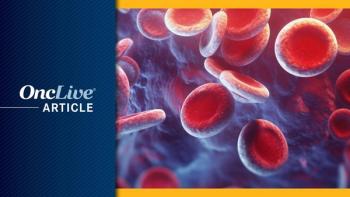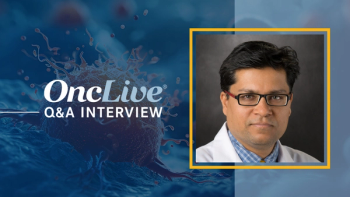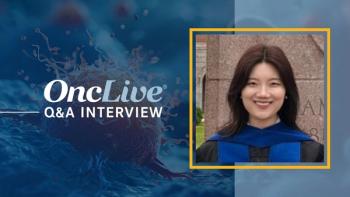
Brexucabtagene Autoleucel Approval in MCL Switches Up Paradigm, Brings on Sequencing Challenges

Brian T. Hill, MD, PhD, reflects on how the approval of CAR T-cell therapy has impacted clinical practice for his patients with MCL, ongoing research with practice-changing implications, and how MCL treatment has evolved during the coronavirus disease 2019 pandemic.
The
“While there are likely many patients out there who are on BTK inhibitors, theoretically, the [CAR T-cell therapy] could be given even before BTK inhibitor therapy,” explained Brian T. Hill, MD, PhD.
Beyond the BTK inhibition versus CAR T-cell therapy debate, some ongoing research in MCL is devoted to de-escalating therapy for patients with minimal residual disease (MRD)–negative disease. For example, the phase 3 ECOG-ACRIN EA4151 trial (NCT03267433) is comparing overall survival outcomes in patients with MCL who are MRD-negative in first remission who undergo autologous hematopoietic stem cell transplant followed by rituximab (Rituxan) versus maintenance rituximab alone.
Hill added that the study, which he said will take years to read out, will likely have practice-changing implications and allows the status of MRD to help inform treatment decisions in MCL.
In an interview with OncLive, Hill, who is director of the Lymphoid Malignancies Program and staff physician at Taussig Cancer Institute, as well as an assistant professor of Hematology and Oncology at the Cleveland Clinic, reflected on how the approval of CAR T-cell therapy has impacted clinical practice for his patients with MCL, ongoing research with practice-changing implications, and how MCL treatment has evolved during the coronavirus disease 2019 (COVID-19) pandemic.
OncLive: How would you categorize the past year in MCL treatment advances?
Hill: There was the FDA approval of CAR T-cell therapy for this disease, but prior to that approval, the mainstay of treatments was traditional chemotherapy with monoclonal antibodies, autologous stem cell transplant (ASCT), and BTK inhibitors. Therefore, what we saw with the study in MCL with using CAR T-cell therapy was a big advance.
How has the addition of CAR T-cell therapy impacted clinical practice? How are your patients tolerating it?
Now that we have FDA approval of brexucabtagene autoleucel for relapsed/refractory MCL, that treatment option is available outside of clinical trials. The study that led to the approval was only in patients who had previously been treated with a BTK inhibitor, such as ibrutinib (Imbruvica) and acalabrutinib (Calquence). However, the approval actually covers all patients with relapsed/refractory MCL.
We have started, at our site, to treat patients with MCL using CAR T-cell therapy as a standard of care. Thus far, we have many patients who need this therapy and are interested in receiving it.
Since it's available in the relapsed/refractory setting, do you envision that brexucabtagene autoleucel could move up to the frontline setting? Or, could it be investigated with other available therapies?
The 2 good questions are: could you move the therapy up? Or, could it be used in combination with other agents? Thus far, although it's still early, we haven't seen any compelling reasons to combine other therapies with CAR T-cell treatment for lymphoma.
Although, there's room for improvement, and certainly, many studies are underway or planned in terms of using CAR T-cell therapy in earlier lines of therapy. There are many ongoing discussions about using this treatment in certain high-risk patient populations with MCL, such as those with TP53 mutations, or those with blastoid variant MCL, a subtype which has traditionally had particularly poor outcomes with traditional chemotherapy, even with high-dose chemotherapy, as is used in ASCT.
We have 3 BTK inhibitors available for use in the second-line setting, and now we have CAR T-cell therapy. What prognostic indicators can be used to determine whether a patient should receive a BTK inhibitor or CAR T-cell therapy after chemotherapy?
That's a great question. If you have patients who have had a frontline regimen—maybe it was anthracycline-based or bendamustine, with or without high-dose cytarabine, and with or without a transplant, most of them will eventually relapse.
The factors that we look for, to clinically get a sense of just how risky the patients are, would include [how long they] were in remission. If they had an induction treatment and maybe a transplant 5 or 10 years ago, then they're likely to do reasonably well with a BTK inhibitor, for example.
If they had a very short remission, or they were refractory to their induction therapy, those are the patients who I think are going to need something more than a BTK inhibitor and should probably move towards CAR T-cell treatments sooner rather than later.
As you know, treating with CAR T-cell therapy is not something you just snap your fingers and make happen. Even in the best of circumstances, there are at least 1 to 2 weeks of arrangements and authorizations that are required to arrange for leukapheresis. [We need to] collect the cells that are required for creation of the patient's CAR T-cell therapy, and then you need about 3 weeks of manufacturing.
Even in the best-case scenarios, you're looking at about 4 weeks, and possibly longer. Unfortunately, sometimes patients with refractory disease really don't have a month to wait. In those circumstances, starting BTK inhibitors is prudent while making arrangements for CAR T-cell therapy.
Those are some great points. Going back to the BTK inhibitors, do any data show that patients can be retreated with BTK inhibitors?
As you pointed out, there are now 3 FDA-approved BTK inhibitors. In chronological order, it was ibrutinib, acalabrutinib, and then zanubrutinib (Brukinsa). They all are highly effective with very high response rates. The median progression-free survival is in the range of 18 to 24 months, depending on how many prior lines of therapy your patients have received.
It's not clear that any one of these agents is superior to the other in terms of efficacy. There are noteworthy differences and toxicities that we can talk about. But, in terms of moving from one to the other, it doesn't work if you're resistant to ibrutinib, for example, then I don't think that zanubrutinib or acalabrutinib is going to work in that setting. However, if you're intolerant to one of them, then yes, it's very reasonable to stay in that same class of drug and switch agents.
You mentioned about those differing toxicity profiles. What are some of the notable differences between the 3 BTK inhibitors?
For the 3 BTK inhibitors, the noteworthy side effects in this class is bleeding and bruising, which seems to be a class effect. Sometimes there are gastrointestinal toxicities, such as diarrhea, which are generally self-limiting.
With the specific agents, we know that arthralgias are commonly seen in ibrutinib, and atrial fibrillation in particular has been found in about 5% to 10% of patients on studies with ibrutinib. We see a signal for atrial fibrillation in patients treated with acalabrutinib, although it seems to be lower. And, in the case of zanubrutinib, the atrial fibrillation rate is likely to be lower based on some direct studies that were done in patients with Waldenström macroglobulinemia.
Of note, acalabrutinib does have a unique toxicity, which is headache, which can be mild to moderate or even severe. It is typically self-limited, but it does sometimes pose a difficult sort of time during the initial ramp-up period of time.
We don't seem to see that was zanubrutinib in the available data. Oncologists and hematologists are starting to get more experienced with using this agent. In terms of cytopenias, the jury's still out a little bit in terms of how much cytopenia that agent causes.
What ongoing research in MCL are you working on that you would like to be mention?
Now that we have a pretty good induction regimen with bendamustine-containing chemotherapy, we see actually a very high proportion of patients who achieve MRD negativity or an undetectable MRD state. For those patients, if we maintain them with rituximab alone as maintenance therapy, their outcomes are pretty favorable.
Historically, for younger, more fit patients, we would have always recommended consolidation ASCT. However, there's a very large, US ECOG Cooperative Group study that is currently comparing head to head the use of ASCT versus rituximab maintenance in patients who are in remission after induction chemotherapy, and have no MRD. That study is going to be very important with potential practice-changing implications.
This study is ongoing and accruing, but it is probably going to take several years before it reads out.
It's interesting to see how this type of approach will perform in MRD-negative patients.
Yes, absolutely. This would be one of the first studies that allows us to use MRD to help guide treatment options. It is also going to ask an important question, which is: do you really need to put patients through this intensive, expensive, and potentially toxic therapy with transplant. Although we want the best for our patients, we don't want to cause them additional harm. If we can find the patients who are going to do well, with less morbid therapy, that would be advantageous.
In looking at the state of where we are in health care right now with the COVID-19 pandemic, what treatment modifications have you had to make, if any, in your patients with MCL?
Early on during COVID-19, there was a concern about giving any kind of myelosuppressive chemotherapy to patients, and many patients were staying away from cancer centers. Perhaps there were some delays in diagnosis.
For MCL specifically, we know it is a sort of relentless disease in most cases. You really need to give your best treatments in the sequence with which we think is optimal. What we've come to recognize is that with proper precautions, and all the things we've been hearing about with masks and social distancing, it's that it's not unsafe to give traditional chemotherapy regimens to patients who have life-threatening diseases who need [such treatment]. The risks that COVID-19 poses are probably minimal over the standard risks of chemotherapy. At this point, I would say it's not making a major impact on diseases like MCL, where we really want to use our best therapies.



































